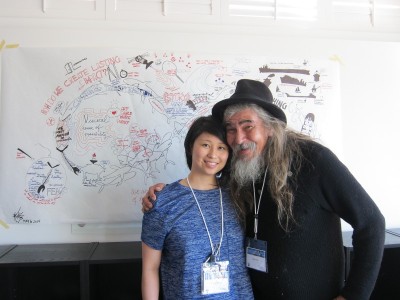 Spaceship Earth - Mesa redonda internacional en el Instituto Peter Wall de Estudios Avanzados, Vancouver
Spaceship Earth - Mesa redonda internacional en el Instituto Peter Wall de Estudios Avanzados, Vancouver
Entre el 5 y el 9 de mayo de 2014, unos científicos, artistas y profesionales se reunieron por invitación de un grupo que incluye Mundus maris para discutir las posibilidades de responder a los desafíos de la vida en nuestro planeta azul en estado de sitio. Los participantes fueron impulsados por la preocupación por el desarrollo de nuevas perspectivas y espacios para la acción. Se negaron ser resignados o volverse cínicos acerca de los muchos indicadores ambientales y sociales deprimentes que muestran el estado de amenaza de los océanos y los ecosistemas de todo el mundo.
The atmosphere was certainly one of discovery of new perspectives thanks to crossing wires of people from very different backgrounds.
 Infact, the blending of diverse knowledge and fields of experience, which does not often happen among highly specialised people. That was itself a rich source of making fresh sense of the world around us.
Infact, the blending of diverse knowledge and fields of experience, which does not often happen among highly specialised people. That was itself a rich source of making fresh sense of the world around us.
Suspending judgement and listening first to the others and then also deep in oneself are among the key ingredients of discovering new opportunities in old and not so old problems.
As a matter of fact, one learns to go beyond a binary thinking of solving problems to one where the wealth of diverse perspectives opens chances for transformations that can slow the frenetic rush towards exploiting every last bit of "resource" on the planet and thus precipitate collapse and accelerate the joint action on alternatives that provide staying power over the long run. Call it sustainability.
The group that had successfully bid for funding of the roundtable by the Peter Wall Institute for Advanced Studies at the University of British Columbia, Vancouver, Canada, was composed of U. Rashid Sumaila, Director of the Economics Research Unit at the Fisheries Centre at UBC, Cornelia E Nauen, President of Mundus maris - Sciences and Arts for Sustainability, and Sarah K. Meltzoff of the Rosenstiel School of Oceanic and Atmospheric Studies of the University of Miami. It was later joined by Maria Scordialos and Vanessa Reid of The Living Wholeness Institute.
To read a chronicle of the Roundtable from the invitation to the conclusion, click here.








